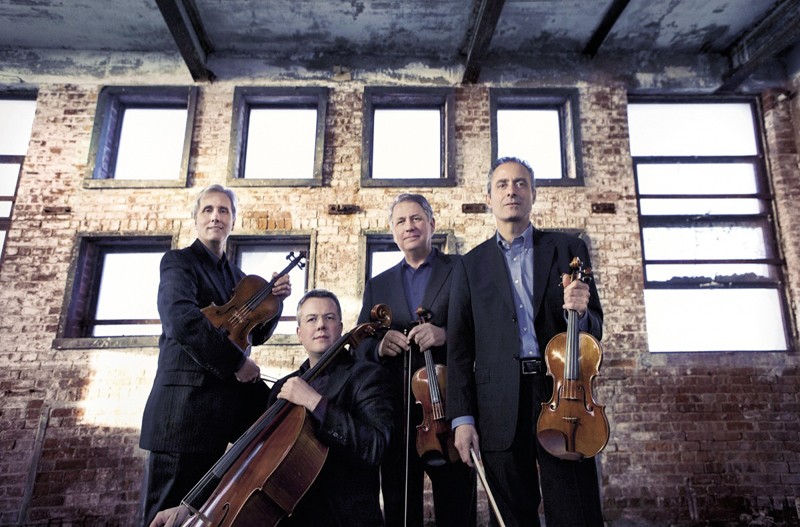THE Emerson String Quartet is to chamber music what the Rolling Stones are to rock 'n' roll: Seminal, timeless, and extremely long-lived.
It’s no exaggeration to say that in their 40-plus years of existence and over 30 albums, ESQ basically authored the image and sound of what modern audiences think of when they imagine a string quartet today.
While Savannah Music Festival attendees have enjoyed the ESQ before, this is the first trip to town with cellist Paul Watkins, their first new member in —wait for it—34 years!
(The rest of the lineup comprises violinists Eugene Drucker and Philip Setzer, and violist Lawrence Dutton.)
The British cellist and conductor “replaces” SMF favorite David Finckel, only the third member to ever leave the group. Finckel now enjoys a successful career playing with his wife, pianist Wu Han—though of course it’s impossible to duplicate the particular chemistry of a group that has played together for several decades.
Watkins has garnered rave reviews for his own unique contributions to the carefully honed sound of the ESQ. We spoke to the newbie —who’s actually toured with ESQ for nearly two years now—last week.
What’s it like to be a new member of a group which almost never has new members? Must be quite daunting.
Paul Watkins: It's incredible. It's an amazing experience. Of course it's still changing and developing. I guess it's been nearly two years since I moved my family to the States, and a bit under two years I've been playing concerts with the Emerson String Quartet.
A tremendous amount of the music is new repertoire for me, and of course new for the other three to play with a different cellist after all that time! It’s a constant process of me learning the piece and them relearning the same piece with a different perspective. It makes rehearsals extremely interesting!
How did such a momentous situation come about?
It actually began happening, I think, before David Finckel decided to leave the Quartet. I had played chamber music with Larry Dutton and Phil Setzer. Those performances had nothing to do with the Quartet —we knew each other—but the experience must have lodged in the back of our minds.
Then of course Gene Drucker and I played Brahms with Danny Hope at Carnegie Hall. So my playing was known to all of them already.
Another thing I share with Danny Hope is we both went to the Menuhin School. I spent five years there. Those five years were really the most important five years of my musical life. It laid the groundwork for everything I’ve done since.
So was there an actual audition?
Before anything was announced, I went to New York to spend a weekend playing with the guys, seeing if we clicked or not. How it really felt to play string quartets.
It was love at first note, I think we’d all agree on that.
I’m not only stepping into a musical entity that’s being honed, I had to work socially coming from the same place. We have, if not totally similar personalities, similar temperaments.
We pretty much decided fairly quickly. Of course it was a big decision for me to move my family across the pond.
This sounds exactly like a VH1 Behind The Music episode about a veteran rock ‘n’ roll band bringing in a new member, right down to the usual number of people in a rock band: Four.
Absolutely right! Apart from the money and fame and drugs, of course (laughs). I guess it is sort of like the archetypal rock group, with four members.
I wonder if that particular number does have something to do with the magical interaction between people musically. You can get wonderful sounds from other combinations, but there is something unique about the number four in music.
I’m intrigued by your extensive conducting background, given that string quartets have no need of a conductor whatsoever and seem to relish mercilessly making fun of conductors in general.
Oh of course! Conductors totally set themselves up for that ridicule, too. But there’s a new generation of conductors who aren’t as dictatorial as they used to be. That said, I try not to bring my conducting background into the picture at all.
Playing in a string quartet seems like it must be quite a musically intimate experience. The four of you are completely on your own up there.
In a strong quartet at its best, everyone is striving to express the music in the most convincing and dynamic way and leave your own ego outside the door, in an environment where criticism is meted out, sometimes harshly.
You have to learn very quickly not to take harsh criticism personally. It’s a hell of a good model for anyone who has to work together in groups. Sports teams, corporations, nonprofits.
The criticism is constant because we constantly want to do the best we can for the pieces. You have to have a thick skin. But also, you have to have a thin skin, because you must be completely sensitive to what the others are doing.
The main difference between playing strings in a symphony orchestra and in a quartet is in a quartet you’re the only voice. You’re much more exposed. There’s no one doubling or echoing your part.
It’s much more nerve-wracking, but also much more satisfying.


